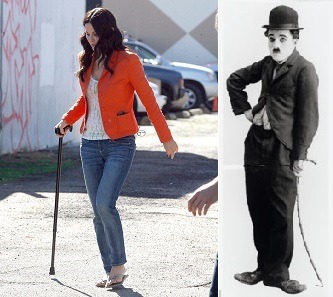People fake limps. Often. From a slight heaviness on one side to a full on Charlie Chaplin stagger, the fake limp is a common sight in today’s West. From children embellishing injuries to adults pretending to need a cane, we’re (almost) all doing it: see this Wiki-How with 10 steps on ‘How to Fake A Limp’. A strange and surprisingly big part of our culture, we often seem to do this without knowing why.
Perhaps the limp, as evidence of an injury, suggests the possibility of something cool or exciting that might have caused it. Perhaps it’s an unconscious call for sympathy connected to the pain and suffering the limp implies. These are both relatively uninteresting explanations, and there is more to it than this.

Courtney Cox with a very cool cane indeed, but the big question is why?
In Lacan’s form of psychoanalysis (the best form), the ‘symptom’ is one of the most important concepts. In psychoanalysis the analysand (the person being analysed) makes a ‘supposition’ that the Other (the analyst) knows the meaning of his symptoms, even when he does not. This is of course false (but its also important that the subject believes it).
Slavoj Žižek develops the idea in Enjoy Your Symptom (even the title rings true to the limp, a symptom we tend to create or at least exaggerate). He brings this idea of the ‘symptom’ into the realm of politics, saying that we, as subjects, don’t know the exact meaning of the ‘master signifier’ that we identify with (i.e. a political party) but we trust that the Other does know and understand our identification and what it says about us. This allows us to see how a part of politics works – evading the need to be understood by the subject by making it appear that the Other (those who read your statement of identification) will do the understanding.
Take the phrase ‘I am a Labour man myself,’ a commonly heard bit of popular political parlance. What does it mean to define ones identity in this way, a suggestive gendered and class-based signifier? The point is that the individual saying the phrase need not understand what it means or says about his identity, because he trusts that the Other will.
Isn’t this what we see in the faking of a limp? The limp is a ‘master signifier’ which somehow seems to define us or show something about us. Do any of the guilty actors, from the child rubbing her knee, to the footballer imitating a war veteran one minute and running 100 metres in 15 seconds the next, to the university lecturer with a psychosomatic stagger, know why it is that they are doing this (and enjoying it)? Probably not; but the subject hopes that the Other does.
If this is right, it shows that unconscious behavior patterns learned from a young age and politics share the same structure. The fake limp then, is a moment in which we see that our behavior is political and our politics is behavioral. At the very least it shows that politics operates on an unconscious level, showing how we construct our identities for the Other.


